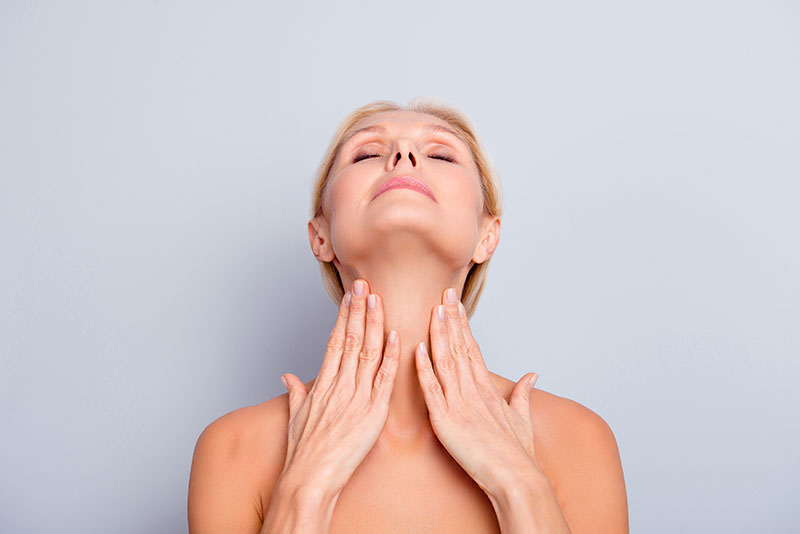
Aging is a part of growing older, though several factors contribute to whether we age gracefully or if we will age faster than our actual age. Many of us already look older than we are, mainly because we engage in behaviors that increase our aging, or we are not actively supporting the health of our body and skin. Knowledge is power, especially when it comes to understanding how your skin ages. The more you know about combating the aging process, the more control you will have toward maintaining a healthier, youthful body and mind.
When it comes down to it, there are two leading causes of premature aging in our skin. These are known as “intrinsic and extrinsic aging.” Intrinsic aging involves our genetics, which is why it is common to show signs of aging between 40 and 50. Extrinsic aging involves external factors that affect the rate of aging in our skin. These factors include environmental, free radical sun damage, and stress.
6 Skin Aging Factors We Can Control:
Smoking
Smoking causes vascular constriction, which means it constricts the blood vessels. This constriction inhibits blood flow and oxygen from reaching skin cells, which damages collagen and elastin-the fibrous components of skin that keep it firm and supple. Vaping contributes the same way as cigarette smoking when it comes to our skin. Even second-hand smoke affects the skin.
Side/stomach sleeping
When you sleep on your side or your stomach, compression and tension are applied to the face while you sleep. Over time, it can cause facial distortion and may lead to an increase in sleep wrinkles. Patients who have a tendency to sleep on only one side may notice that they have more sleep wrinkles on that side of the face. On top of that, not getting enough sleep can also cause wrinkles, so get help from a professional if you have not been able to sleep well.
Alcohol
Regularly and excessively consuming alcohol will worsen skin conditions, such as rosacea and eczema, but will expose you to frequent exposure to stress hormones (glucocorticoids) known to speed aging within the body. Even drinking a moderate amount can dehydrate the skin. Over time, this dehydration causes wrinkles on our skin. When dehydrated, our skin dries from the inside out, causing it to wrinkle more quickly. Fine lines and wrinkles appear and grow deeper over time. Alcohol also reduces vitamin A in our body, which is essential for maintaining firm and youthful skin.
Bad Diet
When consuming food, we usually think about how it will affect our body and what nutritional value the food is going to provide. A diet high in simple sugars and sweets can cause the skin’s connective tissue to become rigid and lose elasticity. While it is hard to get away from sugar, the best thing you can do is to consume fruits and vegetables rich in antioxidants. These foods are skin-friendly, especially fruits rich in vitamin C, like blueberries and blackberries.
Air Pollution
Scientific research has revealed how ongoing daily exposure to pollution dramatically impacts the skin’s health and appearance. All forms of pollution, from cigarette smoke to smog, can cause free-radical damage to the skin. If left unchecked, this damage leads to the breakdown and deterioration of everything skin needs to look healthy and prevent signs of aging. Pollution also throws the skin’s microbiome out of balance by significantly disrupting its barrier, which exacerbates the effects of all types of air pollution.
Stress
Research shows stress wears our bodies down and releases “stress chemicals” into our system. They include adrenaline, norepinephrine, and cortisol. These stress chemicals can create biological changes at a cellular level. Damage at the cellular level happens through oxidative stress and shortened telomeres, which are a part of chromosomes.
Psychological stress can reduce our telomere lengths and, as a result, ages our skin. Oxidative stress overwhelms our bodies repair process and causes premature aging. Some of the most important things you can do for yourself include exercising regularly, setting boundaries with the people in your life, and meditating (or really anything that helps you stay calm).
The next best thing you can do for your skin is to protect it actively. This protection starts with using peptides, which helps stimulate collagen and elastin fibroblasts. This stimulation encourages healing and repair responses in the skin. Combating premature aging skin is all about developing healthy lifestyle changes, along with skincare treatments.
Make sure to use products that contain other beneficial ingredients, including antioxidants like Vitamins A, B, C, and E. Other ingredients include Retinol and hyaluronic acid. Of course, you should also make sure to use sunscreen. It is the best defense we have against the sun to keep our skin looking and feeling youthful.
